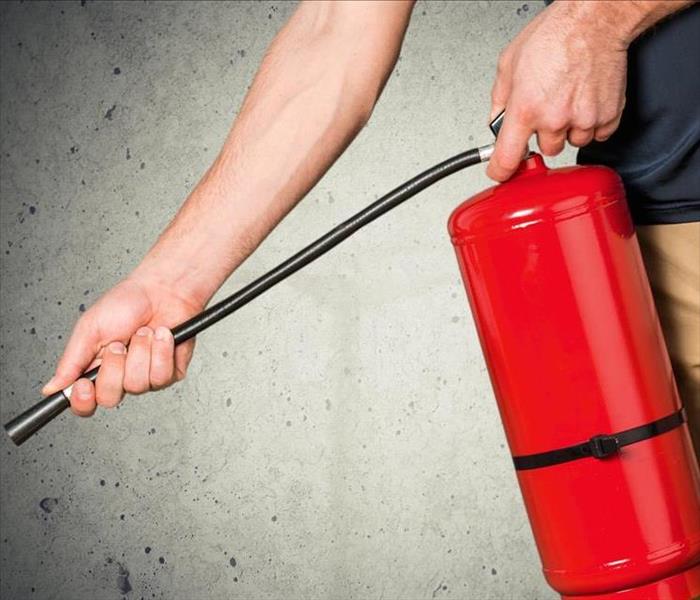The importance of having a fire extinguisher in your Cedar Hill home
9/3/2015 (Permalink)
You could save your Cedar Hill home from fire with a fire extinguisher at your ready.
Close your eyes and imagine. You’re at your Cedar Hill home, or maybe in the office, and you smell ... smoke? Definitely smoke. Fire! You don’t panic, because you’re not the type and you’re prepared. You grab the nearest fire extinguisher, find the flames. You get ready, aim .... and suddenly realize you don’t know how this thing works.Fire extinguishers can be the first line of defense if fire breaks out in your home or business, but they won’t do you any good if you don’t know how to use them or have the wrong extinguisher for the job. When it comes to fire, plan, prepare and remain calm. Knowing how, when and why to use your fire extinguisher—not to mention which fire extinguisher to use—will increase both your safety and peace of mind knowing you can protect you and your belonging from fire damage.
When to Use a Fire Extinguisher
Home or office, when a fire breaks out you have moments to decide: fight or flight? If you feel even the slightest doubt about handling it yourself, move everyone to a safe place and call 911. Ditto if you don’t know how to use your extinguisher or aren’t sure it’s the right class for the fire you’re fighting; better to let the pros handle it than to try to navigate the learning curve mid-fire.
If you decide you can safely put out the fire, grab the extinguisher and get busy, after you locate a safe way out. If you spot a clear exit but it doesn’t look to stay clear long, get out now.
What Kind of Extinguisher to Use
Home- and business owners can choose from five types of fire extinguishers:
- Class A: for a fire involving normal combustibles and flammables, including cloth, paper and wood
- Class B: for a fire involving flammable liquids like gas, oil, paint, paint thinner and solvents
- Class C: to fight a fire involving electrical equipment/appliances that are plugged in and receiving power—electric drills, table saws, computer equipment, televisions, wiring and fuse boxes, for example
- Class D: to put out a fire involving combustible metals—magnesium, sodium, zirconium, etc. (Note: Don’t try to fight this kind of fire unless you’ve been specifically trained for it!)
- Class K: for fires typically found in restaurants, involving cooking oil and commercial-grade cooking equipment
Fire Extinguisher How-to
- Stand six to eight feet away from the flames.
- Make sure you have a clear exit, in case the fire spreads or flames out of control.
- Pull the pin to unlock the operating lever.
- Aim the hose at the base of the fire.
- Press the lever located above the handle to release the agent.
- Use a back-and-forth sweeping motion to saturate the base of the fire until the flames are extinguished.
- Continue the process if the fire re-ignites.
- If the fire doesn’t go out or spreads, get to safety.
- Install fire extinguishers in areas where fires are likely to break out, including kitchens and break rooms.
- Check periodically to make sure all fire extinguishers are fully charged.
- Show every family member or employee where the fire extinguishers and fire alarms are located.
- Train yourself, your loved ones and your co-workers to use the equipment properly.
Even with a fire extinguisher, some fire damage will occur. When this happens, call your local SERVPRO of Northwest Dallas. (214) 361-7887. They live and work in the local community just like you and they can help make it, "Like it never even happened."





 24/7 Emergency Service
24/7 Emergency Service